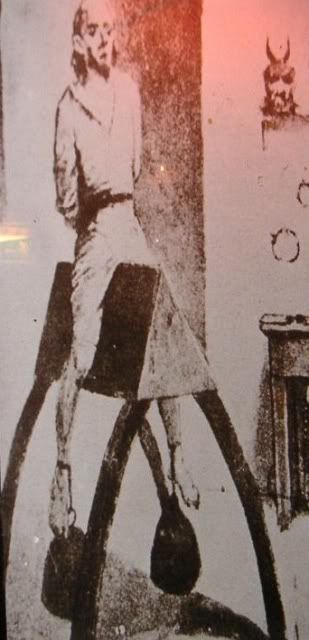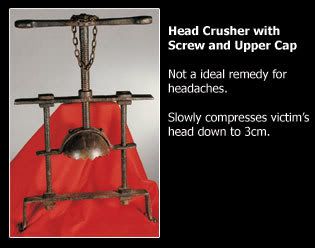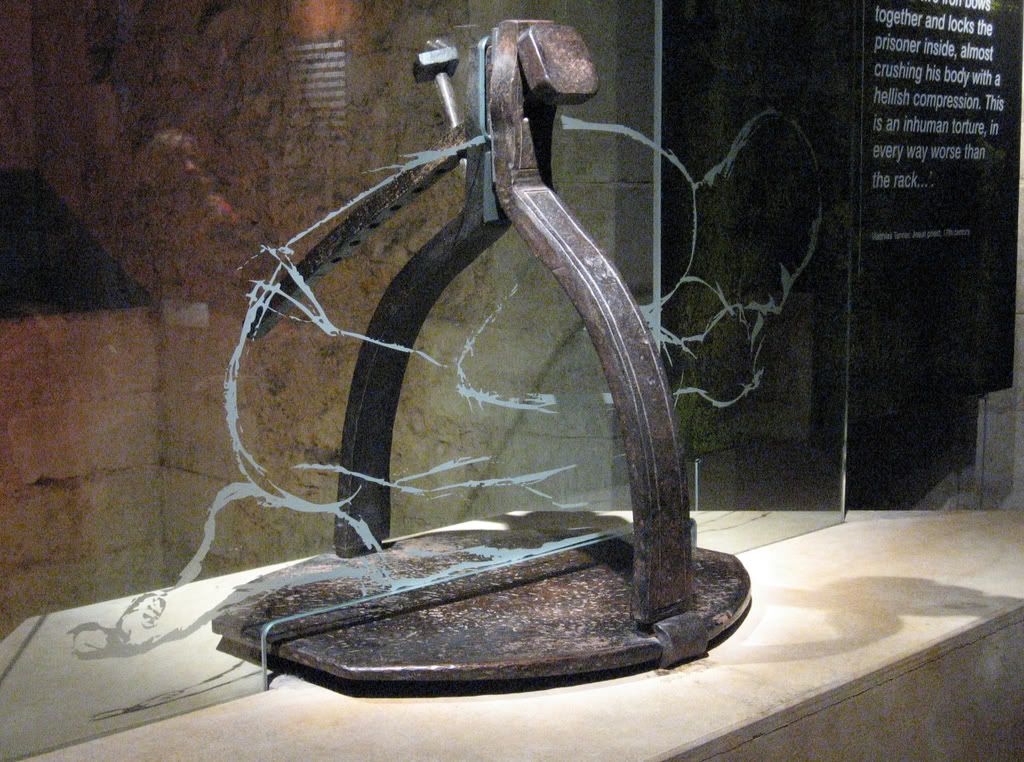| Topic: What to Do with G.W. Bush? | |
|---|---|
|
Now that a bipartisan blue-ribbon panel has reached the conclusion that President George W. Bush and his top advisers bear “ultimate responsibility” for authorizing torture in violation of domestic and international law, the question becomes what should the American people and their government do.
The logical answer would seem to be: prosecute Bush and his cronies (or turn them over to an international tribunal if the U.S. legal system can’t do the job). After all, everyone, including President Barack Obama and possibly even Bush himself, would agree with the principle that “no man is above the law.” At least that is what they profess in public, but they then apply this principle selectively, proving that they don’t really mean it at all. The real-world standard seems to be: you are above the law if you have the political or economic clout to make prosecution difficult or painful. Then, more flexible rules apply. For instance, we’re told that Pvt. Bradley Manning may have had good intentions in exposing U.S. government wrongdoing to WikiLeaks, but he still must be punished for taking the law into his own hands. The only question seems to be whether he should be imprisoned for 20 years or life. Even the U.S. soldiers at Iraq’s Abu Ghraib prison who imitated the abusive techniques that Bush and his advisers authorized in more limited situations had to face justice. Eleven were convicted at court martial, and two enlisted personnel – Charles Graner and Lynndie England – were sentenced to ten and three years in prison, respectively. A few higher-level officers had their military careers derailed. But the buck pretty much stopped there. It surely didn’t extend up to Defense Secretary Donald Rumsfeld, National Security Advisor Condoleezza Rice, White House counsel Alberto Gonzales, Vice President Dick Cheney and President Bush. They simply engaged in a game of circular excuse-making, claiming that they had relied on Justice Department legal guidance and thus their own criminal actions really weren’t criminal at all. Yet, along with its judgments about torture, the 577-page report from the Constitution Project obliterated that line of defense by detailing how the Bush administration’s lawyers offered up “acrobatic” legal opinions to justify the brutal interrogations, which included waterboarding, sleep deprivation, stress position, forced nudity and other acts constituting torture. Lawyers from the Justice Department’s Office of Legal Counsel, particularly John Yoo and Jay Bybee, collaborated closely with senior administration officials in choreographing these legal gymnastics. Then, when other government lawyers later challenged the Yoo-Bybee rationalizations, those lawyers faced career reprisals from the White House. They were essentially forced out of government, the report found. In other words, Bush’s team had arranged its own legal opinions that empowered the President do whatever he wanted. Indeed, the Yoo-Bybee legal opinions gave the President carte blanche by citing his supposed “plenary powers,” meaning that he could do literally anything he wished during “wartime,” even a war as nebulously defined as the “war on terror.” Establishment Blessing While the new torture report mostly covers old ground about how the Bush administration moved into the “dark side,” the report’s primary significance is that its 11-member panel represents a bipartisan mix of Establishment figures. The task force was headed by two former members of Congress who have worked in the Executive Branch – James R. Jones, D-Oklahoma, an ex-ambassador to Mexico, and Asa Hutchinson, R-Arkansas, who served as an under-secretary of Homeland Security during the Bush administration. Other members were prominent Americans from the fields of military, academia, law, ethics and diplomacy – including former FBI Director William Sessions and longtime senior diplomat Thomas Pickering. The report didn’t mince words in its principal conclusions: “Perhaps the most important or notable finding of this panel is that it is indisputable that the United States engaged in the practice of torture. This finding, offered without reservation, is not based on any impressionistic approach to the issue. … “Instead, this conclusion is grounded in a thorough and detailed examination of what constitutes torture in many contexts, notably historical and legal [including] instances in which the United States has leveled the charge of torture against other governments. The United States may not declare a nation guilty of engaging in torture and then exempt itself from being so labeled for similar if not identical conduct.” The report also noted that the behavior of the Bush administration deviated from the most honorable traditions of U.S. history, dating back to the Revolutionary War and General George Washington’s instructions to his troops not to respond to British cruelty in kind but to treat prisoners of war humanely. In contrast to those traditions, after the 9/11 attacks, the Bush administration approved specific techniques of torture while formulating legal rationalizations for these violations of law. Never before, the report found, had there been “the kind of considered and detailed discussions that occurred after 9/11 directly involving a president and his top advisers on the wisdom, propriety and legality of inflicting pain and torment on some detainees in our custody.” Beyond the illegality and immorality of torture, the report found “no firm or persuasive evidence” that the harsh interrogations extracted information that could not have been obtained by legal means. The report also challenged the legality of “enforced disappearances,” renditions and secret detentions. No Accountability Yet, the panel demanded no meaningful accountability from Bush and his top aides, as former Ambassador Pickering made clear in a Washington Post op-ed on Friday. In underscoring the report’s findings, Pickering lamented how the Bush administration’s use of torture had imperiled efforts to persuade other countries not to resort to cruel and inhuman treatment of prisoners. “Democracy and torture cannot peacefully coexist in the same body politic,” Pickering wrote. He proposed several steps “to mitigate the damage and set this country on a better course.” This list included finally confronting the harsh truth about torture; releasing relevant evidence that the Obama administration is still keeping secret; enacting new legislation to close “loopholes” that were exploited to justify torture; and insisting on verifiable protections of prisoners transferred to other countries (rather than relying on “diplomatic assurances”). However, neither the report nor Pickering’s op-ed addressed the significant point that laws against torture and mistreatment of prisoners already existed and that Bush and his team simply had ignored or evaded them. If Bush and Yoo could concoct an excuse giving the President the “plenary” power to do whatever he wants in wartime, why couldn’t some future President and legal adviser do the same? What good does it do to tighten “loopholes” if a President and his aides can flout the law and escape accountability? The only rational (and legal) response to Bush’s use of torture is to arrest him and his key advisers and put them on trial. Yet, in this case, the rational and legal remedy is considered unthinkable. If President Obama’s Justice Department were to move against Bush and other ex-officials, the Washington Establishment – from the Republican Party to the mainstream news media to much of the Democratic Party – would react in apoplexy and outrage. There would be fears about Washington’s intense partisanship growing even worse. There would be warnings about the terrible precedent being set that could mean that each time the White House changes hands the new administration would then “go after” the former occupants. There would howls about the United States taking on the appearance of a “banana republic.” However, there also are profound dangers for a democratic Republic when it doesn’t hold public officials accountable for serious crimes, like torture and aggressive war. Indeed, one could argue that such a country is no longer a democratic Republic, if one person can operate with complete impunity amid declarations of “plenary powers” – which is what the Bush administration claimed in its memos justifying torture. The report from the Constitution Project can declare that torture is incompatible with democracy, but it is equally true that if the President can torture anyone he chooses and then walk away – free to attend baseball games, celebrate his presidential library and pose for the cover of “Parade” magazine – then you are not living in a real democracy. _______ About author Robert Parry broke many of the Iran-Contra stories in the 1980s for the Associated Press and Newsweek. His latest book, Secrecy & Privilege: Rise of the Bush Dynasty from Watergate to Iraq, can be ordered at secrecyandprivilege.com. It's also available at Amazon.com, as is his 1999 book, Lost History: Contras, Cocaine, the Press & 'Project Truth.' http://www.smirkingchimp.com/thread/robert-parry/49187/what-to-do-with-g-w-bush |
|
|
|
|
|
Edited by
Jennerling
on
Mon 04/22/13 02:57 PM
|
|
    Just a few suggustions Just a few suggustions
|
|
|
|
|
|
then all of congress should be held liable... i really don't think GWB tortured anyone, and what good would it do to persecute him when our current pres is killing innocent people with drones in countries we are not at war with?
|
|
|
|
|
|
Besides, water boarding is not torture
|
|
|
|
|
|
Besides, water boarding is not torture and it's not blowing them and their whole family up with a drone, either... |
|
|
|
|
|
a bipartisan blue-ribbon panel
what authority do they have? anything about them having authority in the constitution? guess we just gotta let George live his life since deniability is in effect without a direct signature from him authorising the actions,, which I doubt they have |
|
|
|
|
 Use the scavenger's daughter, get medieval on their *****, Created during Henry VIII’s reign, the Scavenger’s Daughter is a torture device that consists of an A-frame shaped metal rack that compresses the body painfully. The top point of the A is where the head was strapped, the mid-point was for the hands, and the lower ends were for the legs. This position forced the head to swing down and the knees to sit up in a painful posture that caused one’s blood to gush out of the ears and nose. Use the scavenger's daughter, get medieval on their *****, Created during Henry VIII’s reign, the Scavenger’s Daughter is a torture device that consists of an A-frame shaped metal rack that compresses the body painfully. The top point of the A is where the head was strapped, the mid-point was for the hands, and the lower ends were for the legs. This position forced the head to swing down and the knees to sit up in a painful posture that caused one’s blood to gush out of the ears and nose.
The purpose of the entire procedure was to extract valuable information from the prisoner regarding his crimes, his accomplices, and all other relevant details. 
|
|
|
|
|
|
a bipartisan blue-ribbon panel what authority do they have? anything about them having authority in the constitution? guess we just gotta let George live his life since deniability is in effect without a direct signature from him authorising the actions,, which I doubt they have A self-appointed "bipartisan blue-ribbon panel" of private citizens might be able to put on a show for people suffering from Bush Derangement Syndrome, but such a "panel" would be figuratively "toothless". The panel wouldn't have the legal authority to force anyone to testify. The panel could obtain public documents through the Freedom of Information Act, but couldn't obtain classified White House documents. It seems to me that the contents of the OP were written by a Bob-Woodward wannabe who has a book that he wants people to buy. |
|
|
|
|
|
Oh please!
|
|
|
|
|
|
The local troll under the mingle2 bridge is begging for it's two minutes again. |
|
|
|
|
|
Now that a bipartisan blue-ribbon panel has reached the conclusion that President George W. Bush and his top advisers bear “ultimate responsibility” for authorizing torture in violation of domestic and international law, the question becomes what should the American people and their government do. http://www.smirkingchimp.com/thread/robert-parry/49187/what-to-do-with-g-w-bush What Blue-Ribbon Panel? This is the First that I've heard of it; who appointed it? By the way, I fixed the link. |
|
|
|
|














